|
|
|
Sort Order |
|
|
|
Items / Page
|
|
|
|
|
|
|
| Srl | Item |
| 1 |
ID:
129007
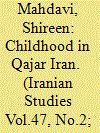

|
|
|
|
|
| Publication |
2014.
|
| Summary/Abstract |
The history of children in general and that of Persian children in particular is that of the inarticulate. The social history of Iran is a neglected field although in recent decades a preponderance of material has appeared on the history of women. Aside from this no work has been undertaken on the private life of the period including childhood and family life. This article examines various aspects of the position and upbringing of children in Qajar Iran ranging from the rearing of children to their status in the family, discipline, amusements and education. This investigation attempts to cover the childhood of different sexes and social classes both in rural and urban areas. The discussion is limited to Shi'i children, the majority population of Iran.
|
|
|
|
|
|
|
|
|
|
|
|
|
|
|
|
| 2 |
ID:
148810
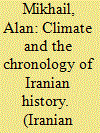

|
|
|
|
|
| Summary/Abstract |
This article offers a chronology of climate events in Iran over the last millennium to challenge traditional chronologies of the Iranian past based on politics, war, and economics. Using insights gleaned from the historiography of climate in Iran, and from neighboring regions, especially the Ottoman Empire, four episodes of climate cooling show how climate-induced environmental processes affected more people for longer in Iran than did the policies of the empires ostensibly ruling over them. Thus, the article aims to put climate more squarely on the agenda of historians of Iran so that the conjectures advanced here can be confirmed, revised, or discarded through future empirical research. Moreover, the article seeks to bring Iran into wider conversations in environmental and global history.
|
|
|
|
|
|
|
|
|
|
|
|
|
|
|
|
| 3 |
ID:
129010
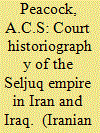

|
|
|
|
|
| Publication |
2014.
|
| Summary/Abstract |
This paper reexamines the Arabic and Persian historical literature of the Seljuq period (1040-1194), concentrating on works produced in circles connected with the sultanic court. It considers the relationship between the Arabic and Persian works, the authors' motives for composition, and the reasons for choice of language. It also compares these works with their predecessors, especially the historiography of the Ghaznavid court, with a view to assessing the particular characteristics of Seljuq historical writing, which is often considered rather slight and unimpressive. One reason that is often adduced for this is the absence of dynastic history writing under the Seljuqs, and the alleged lack of interest of the Seljuq court in patronizing historiography, themes which we also investigate here.
|
|
|
|
|
|
|
|
|
|
|
|
|
|
|
|
| 4 |
ID:
104193


|
|
|
|
|
| Publication |
2010.
|
| Summary/Abstract |
Early nationalist thought in nineteenth-century Iran emphasised the lost glories of the Zoroastrian pre-Islamic past, which it held for a utopian society of refinement, progress, and power destroyed by the advent of Islam. This article aims to show the prominence of this archaistic movement in the early phase of Iranian nationalism by highlighting the impact of an Indian Parsi traveller named Manekji Limji Hataria on nationalist intellectuals. Because of his religious background as a Zoroastrian, Manekji came to be perceived as an emissary of Iran's Golden Age. Fully aware of the potential influence this perception granted him, Manekji endeavoured to disseminate neo-Zoroastrian, pre-Islamic-centred, and frankly anti-Arab/anti-Islamic readings of history among intellectuals, and thus succeeded in having a disproportionate influence on the nationalist definition of Iranian history and identity.
|
|
|
|
|
|
|
|
|
|
|
|
|
|
|
|
| 5 |
ID:
133311
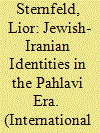

|
|
|
|
|
| Publication |
2014.
|
| Summary/Abstract |
A few years ago, while conducting archival research on Pahlavi-era Iranian newspapers, I came across a photo from the anti-shah demonstrations that took place in late 1978 and early 1979. It showed a large group of Armenians protesting against the shah. In these years many Iranians and Westerners considered the shah's policies beneficial for religious minorities in Iran. Around the same time, I found a sentence that made this discovery more intriguing. In his seminal work Iran between Two Revolutions, Ervand Abrahamian mentions that throughout the Muhammad Riza Pahlavi era, the opposition to the communist Tudeh party accused it of being controlled by "Armenians, Jews, and Caucasian émigrés." I tried to find references in the current scholarship to Jews participating in the party, which could have earned them their part in this propaganda campaign, but found very little. Having read the important works of Joel Beinin, Orit Bashkin, and Rami Ginat on Jewish revolutionaries, including communists, in the Middle East, I wondered where the Jewish radicals in Iran were. Several factors may contribute to this silence in the historiography: the writing of Iranian history from a Zionist vantage point, a lack of interest in the history of the Iranian left in the postrevolutionary historiography, and an inability to conceptualize the transregional and global nature of the Iranian Jewish community.
|
|
|
|
|
|
|
|
|
|
|
|
|
|
|
|
| 6 |
ID:
129015
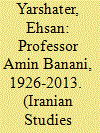

|
|
|
|
|
| Publication |
2014.
|
| Summary/Abstract |
Professor Amin Banani was one of the pillars of Iranian Studies in the United States and his passing leaves a conspicuous and regrettable gap in providing instruction and guidance with respect to Iranian history and Persian literature. He could speak with authority about the entire field of Iranian Studies, even though his expertise did not extend to pre-Islamic Iranian languages and religions.
|
|
|
|
|
|
|
|
|
|
|
|
|
|
|
|
| 7 |
ID:
128996
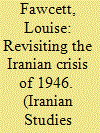

|
|
|
|
|
| Publication |
2014.
|
| Summary/Abstract |
The Iranian crisis of 1946 occupies a significant place in the early history of the Cold War. While this fact has been increasingly acknowledged by scholars, there remain aspects of the crisis, in particular the motivations of the major actors involved, which demand further exploration. This article reconsiders the roles of early Cold War actors, including the United Kingdom, the United States, the Soviet Union and Iran itself in the Azerbaijan crisis and offers a synthesis of different perspectives. In revisiting the crisis it draws upon Cold War and post-Cold War literature including recently available archival material. It aims to combine contributions from International Relations, the Cold War and Iranian history to offer a balanced and integrated narrative of events.
|
|
|
|
|
|
|
|
|
|
|
|
|
|
|
|
| 8 |
ID:
128997
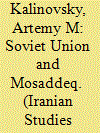

|
|
|
|
|
| Publication |
2014.
|
| Summary/Abstract |
Although it is generally accepted that the Soviet Union did not play a significant role in the events leading to the overthrow of Mohammed Mosaddeq in 1953, little has been written about how the Soviets perceived the Iranian leader and the movement he inspired. This article argues that Soviet leaders generally saw Mosaddeq as weak and ill-disposed towards the Soviet Union. The Soviet failure to secure an oil concession in Iran in 1946 and general conservatism about anti-colonial movements during the late Stalin period conditioned their assessment of Mosaddeq's premiership. After Soviet policy towards the Third World changed in the mid-1950s, Mosaddeq's movement was reinterpreted as a genuine "struggle of national liberation."
|
|
|
|
|
|
|
|
|
|
|
|
|
|
|
|
| 9 |
ID:
129006
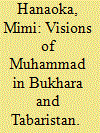

|
|
|
|
|
| Publication |
2014.
|
| Summary/Abstract |
Persian authors couched claims to the religio-political authority and legitimacy of their cities through dream narratives in local histories written between the tenth and thirteenth centuries. Persians did not always fit neatly into genealogical claims to legitimacy like the Arab descendants of Mu?ammad and his clan, and dreams form alternate avenues that sanctify and legitimate specific Persian cities and individuals. Dream narratives embedded in T?r?kh-i Bukh?r? and T?r?kh-i ?abarist?n are literary devices that bring the prestige of religious authority to their city and province and to specific persons. These dream narratives are not only windows into understanding the broader social, political, and religious contexts of local histories but also the particular anxieties and priorities of the authors.
|
|
|
|
|
|
|
|
|
|
|
|
|
|
|
|
|
|
|
|
|